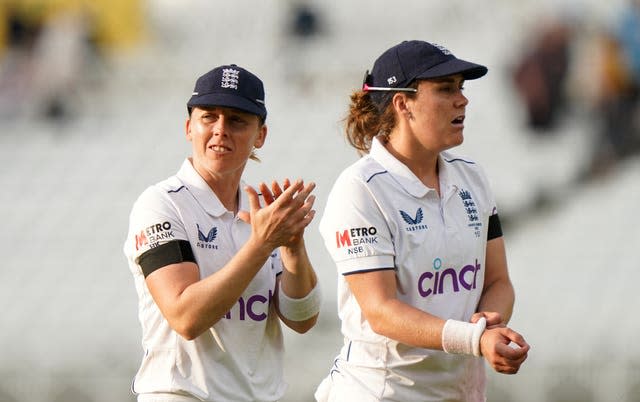From Ashes battles to World Cup woes, the cricketing year in review
Outsiders often marvel at cricket’s ability to conjure a draw from matches that last five days at a time, but 2023 took the concept to extremes as two separate Ashes contests stretched across nearly seven weeks concluded with honours even.
And, as if to prove that the magic lies in the journey rather than the destination, it was by a distance the most gripping Ashes summer in a generation.
In the men’s series, two wonderfully matched teams scrapped tooth and claw as the ledger ended level at 2-2, England only denied a famous victory from two down by a 48-hour deluge in Manchester.
An incredible series comes to an end and the Ashes are staying with Australia.
Thanks to all the fans both here and at home for your support, and thanks for some bloody great cricket @englandcricket 🤝
Until next time! 🇦🇺 #Ashes pic.twitter.com/xeENPjRtSr
— Cricket Australia (@CricketAus) July 31, 2023
In the women’s multi-format match-up, finally afforded equal billing and staged concurrently at the peak of the season, things were just as tight. The decision to offer a five-day Test, rather than the four-day affairs that have so frequently forced draws, allowed a bold Australian victory in spite of Tammy Beaumont’s epic double century, tipping the scales heavily towards an away win.
Instead, Heather Knight’s team rallied to unseat the world’s most reliable white-ball winning machine in both the the T20 and ODI legs and tie the points score at 8-8.
In both instances the tourists retained the Ashes as holders, but in each case the rivalry was bolstered afresh. Pat Cummins’ Australia failed in their stated mission of winning behind enemy lines for the first time since 2001 – a permanent gap on the CVs of decorated veterans such as Steve Smith, David Warner and Mitchell Starc – while Alyssa Healy’s group saw the limited-overs dominance that forms their core identity challenged and eroded.
In a cricket landscape facing rapid, exponential change in the face of the franchise juggernaut, it was a timely reminder that the Ashes can still deliver in a vital, visceral way.

The memorable moments were vivid and plentiful. Zak Crawley kicked the whole circus off by crashing the first ball of the series through cover for four with a flourish that spoke a thousand words.
Lord’s brought a major flashpoint as Alex Carey ran out Jonny Bairstow in an act that was either elite opportunism or craven skullduggery, depending on your side of the divide.
In an unlikely twist, the famously genteel surroundings of the Long Room became the most expensively dressed bear pit in the sporting world and helped create a frisson that never quite went away. Ben Stokes’ defiantly doomed century on one good leg could not save that game but laid the ground for a profound shift in fortunes.
Chris Woakes and Mark Wood were late arrivals but star turns, Moeen Ali’s rollercoaster comeback ended on a grace note and Crawley hit a jaw-dropping 189 at Old Trafford before the prospect of a winner-takes-all decider fell foul of the rain.

It fell to Stuart Broad to provide a fitting final chapter, announcing his retirement midway through the match before penning his own perfect swansong at the Oval. He hit his final ball as a batter for six and walked into the sunset having taken the winning wicket with his last ever delivery.
Katharine Sciver-Brunt also bowed out after two decades as a standard-bearer in the women’s game. There was no fairytale finish here, a losing effort against South Africa in the T20 World Cup semi-final spelling the end of her Three Lions career, but the departure of the country’s record limited-overs wicket-taker leaves just as big a void.
That tournament was a disappointment for a team with their eyes on the top prize, but a roaring success compared to the efforts of England’s men in India. Looking to retain the 50-over crown they famously won at Lord’s in 2019, Jos Buttler and company produced a ripe contender for the most shambolic title defence ever seen in elite sport.

Near favourites at the start of the campaign, they lost six of their first seven games as they sleep-walked out of contention. Lacking identity, hopelessly out of form and shorn of intent they became the biggest scalp in Afghanistan’s history and were thrashed by a Sri Lanka side led by Chris Silverwood, the man they sacked 18 months earlier.
Buttler and head coach Matthew Mott lived to fight another day but barely had time to lick their wounds before being pressed back into action in the West Indies, where their latest one-day reset began in defeat.
In 2024 both teams will turn their attention to the 20-over format, with the men defending their 2022 title in the Caribbean and USA and Knight’s women eyeing an overdue T20 success of their own having previously triumphed in the inaugural edition 15 years ago.

 Yahoo Sport
Yahoo Sport 


































































